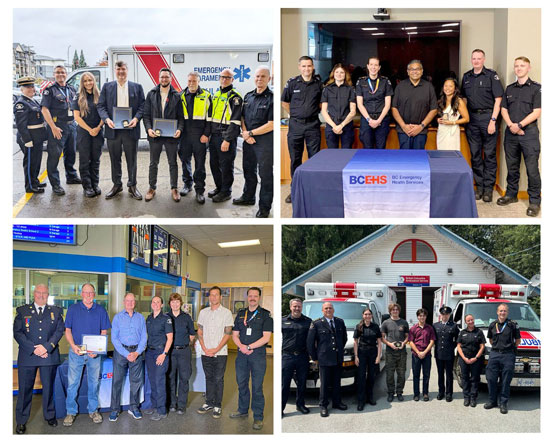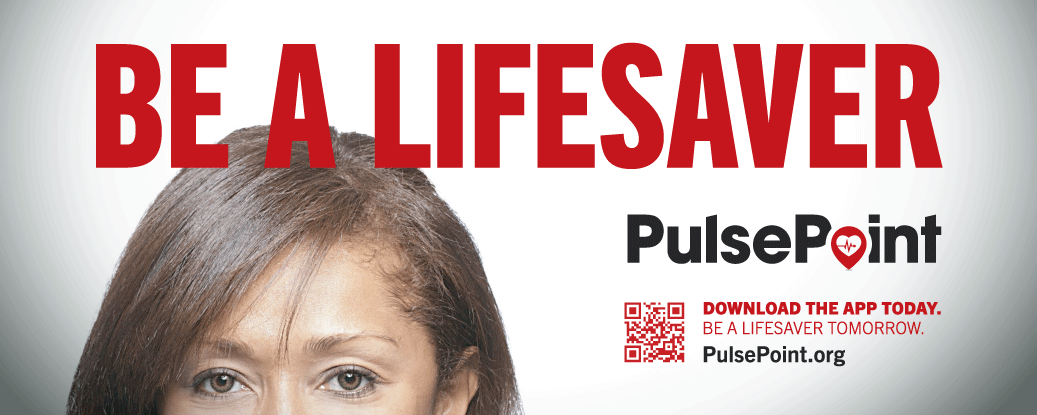by Danae Gale
This award was created to recognize the important contributions made by members of the public during cardiac arrest emergencies in B.C. It honours the quick-thinking actions of bystanders, who call 911, and are involved in saving a life through successful CPR efforts with or without the use of an automated external defibrillator (AED).
Award recipients receive a personalized certificate and a coin to commemorate their quick-thinking and selfless actions, which were the “vital link” to a patient’s survival.
Vital Link Award recipients are nominated by BCEHS paramedics, emergency medical dispatchers or supervisors who want to express their gratitude for the exceptional help they received at the scene of a cardiac arrest.
The quick actions of bystanders who bravely jump into action during a cardiac arrest emergency can significantly improve the patient’s chances of survival and can often be the difference between life and death.
Paramedics and dispatchers rarely have the opportunity to reunite with their patients, so meeting them again at a Vital Link Award ceremony is truly special.
Advanced Care Paramedic, Lisa Salt believes the Vital Link Awards are important for both the public and our staff. Performing CPR can be intimidating if you are not trained, so it takes bravery and selflessness to step in. This award acknowledges this humanity and helps inspire others in the community. It also brings positive attention to what was an otherwise traumatic event for both the bystanders and the patient.
Lisa says, “As practitioners, we don't always get to see the patient after resuscitation efforts, so it’s very humbling to interact with them once they have healed. It is an honour to help someone's during a vulnerable moment, and celebrating the joint effort with everyone involved is uplifting and memorable.
Last year, Lisa had the pleasure of participating in a heartfelt reunion after life-saving CPR intervention. The award ceremony not only honoured Bryce Young, but it also gave his family a chance to meet and thank the paramedics involved in saving his dad’s life.
After presenting Bryce with the Vital Link Award, Lisa said, “Bryce’s actions were crucial, he was that vital link in the chain of survival.”

Bryce Young and family with responding paramedics
In her first role at BCEHS, Daria Nowaczek supported the Vital Link Awards, which gave her a meaningful introduction to BCEHS and the field of paramedicine. These awards highlight the exceptional care and expertise of our staff, highlighting not just their quick and skilled responses, but also their genuine compassion for patients and bystanders.
Daria says that Vital Link Award ceremonies offer a unique opportunity for one-of-a-kind reunions. She has seen complete strangers become lifelong friends after one person saved the other’s life and has seen families ask for hugs from Emergency Medical Call-takers, who were there to support them in their time of need. The ceremony provides a meaningful closure, not just for the community members being honoured, but also for our dedicated staff.
After speaking with many of our front-line staff about their experiences with these awards, Daria noticed some common themes: a humble approach to the role they played, empathy combined with a great sense of humour, and a heartfelt reflection on a positive outcome that they will never forget.
Daria says that every call honoured is special in its own way. She felt privileged to support these awards. There are a couple of awards that hold a special place in her heart.
One is Mary Lee Block who performed CPR on a remote hiking trail in Mount Erskine Provincial Park on Salt Spring Island in March 2021. Read the story: Emergency medical call-taker reunites with caller and patient.

Pictured from left to right: David Block, Justin Pauwels, Mary Lee Block
The other is Bryce Young who helped save his father’s life. The whole family attended the ceremony, and each person wrote a thank you card addressed to our staff about what it meant to them to have their father still around, which was incredibly touching.

Photos from recent Vital Link Award ceremonies
In her role as a coordinator in the BCEHS Employee Recognition department, Keerit Dhaliwal has learned that cardiac arrests often have low survival rates, with outcomes heavily dependent on immediate bystander intervention. She feels honoured to play a part in recognizing their bravery and reuniting everyone at a Vital Link Award ceremony.
Keerit says that these awards not only recognize acts of courage but also have a ripple effect, inspiring others in the community to learn CPR and be ready to act when it counts.
She recalls the teachers at South Delta Secondary who saved a colleague’s life with quick, decisive action. This incident underscores the importance of having access to AEDs and highlights the value of initiatives like high school first aid programs.
Keerit feels fortunate to have a job where she gets to help recognize and celebrate everyday heroes! What she loves most about organizing the award ceremonies is seeing the emotional reunions between patients, bystanders, and paramedics. These moments are deeply moving and serve as a powerful reminder of why our work matters - it’s truly humbling. Bringing everyone together for the first time after a traumatic event is crucial for closure. The gratitude, shared stories, and the new friendships that come from these ceremonies are unforgettable and she is grateful to witness it all.
Public Information Officer, Brian Twaites has participated in many Vital Link Award ceremonies.
Brian says “As paramedics, we respond to cardiac arrests often, without really thinking about the experience from a bystander’s perspective. Many years ago, my wife and I stopped at a car where someone had collapsed and found the patient to be in cardiac arrest. Being involved in a resuscitation, but as a bystander in this case, was very surreal for the both of us. When I reflect on this experience, I can relate to the emotions the rescuers are feeling, and I am able to share those feeling with them at these events.”
Brian feels truly humbled to be able to take part in many of the Vital Link Award presentations. He is incredibly grateful to our BCEHS recognition team for the amazing work they do in organizing these special events.
“Being part of a successful resuscitation as a paramedic is truly a gift. Knowing that your patient will go home to be with friends and family is incredibly rewarding. Without the help from bystanders and early CPR, this gift is often not possible. I have immense respect for every bystander who steps up to help deliver that gift.”
Learning CPR is a selfless gift that can help both loved ones and strangers. In an emergency, our BCEHS Emergency Medical Call Takers (EMCTs) are ready to guide you through high-quality CPR.
The importance of CPR knowledge cannot be overstated. Each year, over 60,000 Canadians experience sudden cardiac arrests outside of hospital. When this happens, bystander CPR and/or the use of AEDs can increase the chance of survival by up to 50%. While it may seem intimidating to do CPR and apply an AED, it is not.
“Our front-line paramedics and dispatchers see first-hand how bystander CPR can save lives,” says Brian. “Sudden cardiac arrest is just that – it’s sudden and leaves patients unresponsive. If you’re unsure what to do in an emergency, don’t worry - just call 911. Our highly trained emergency medical call takers will guide you on how to care for a patient until paramedics arrive on scene.”
CPR can be performed by anyone who has had basic training or is being coached by someone who is trained, such as a BCEHS call taker when you call 911.
If you are trained in CPR, download the PulsePoint Respond App to get alerts and help victims of sudden cardiac arrest.

If you see someone having a sudden cardiac arrest, follow these three simple steps:
- Call 911
- Do CPR
- Use an AED

